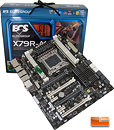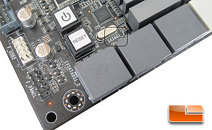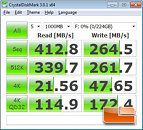- Joined
- Oct 9, 2007
- Messages
- 47,384 (7.52/day)
- Location
- Hyderabad, India
| System Name | RBMK-1000 |
|---|---|
| Processor | AMD Ryzen 7 5700G |
| Motherboard | ASUS ROG Strix B450-E Gaming |
| Cooling | DeepCool Gammax L240 V2 |
| Memory | 2x 8GB G.Skill Sniper X |
| Video Card(s) | Palit GeForce RTX 2080 SUPER GameRock |
| Storage | Western Digital Black NVMe 512GB |
| Display(s) | BenQ 1440p 60 Hz 27-inch |
| Case | Corsair Carbide 100R |
| Audio Device(s) | ASUS SupremeFX S1220A |
| Power Supply | Cooler Master MWE Gold 650W |
| Mouse | ASUS ROG Strix Impact |
| Keyboard | Gamdias Hermes E2 |
| Software | Windows 11 Pro |
Intel's X79 chipset for Sandy Bridge-E platform was originally designed to have four SAS (serial-attached SCSI) channels apart from its usual loadout of SATA ports. Early prototypes of socket LGA2011 motherboards displayed at last year's Computex event (June), carried a large number of chipset-driven ports. However, Intel found the chipset-integrated SAS RAID controller (independent device from the SATA RAID controller) to have "unreliable performance", and hence changed its specification at the last moment. So the production specification of X79 ended up having the same SATA port loadout as P67 (two SATA 6 Gb/s + four SATA 3 Gb/s).
This specifications change did not result in a design change of the X79 PCH package, its die remained the same, so did its package and pin-map, which motherboard vendors had for nearly an year. So ECS decided to implement the SAS ports despite being out of specifications. LegitReviews discovered that its X79R-AX sample very much did have SAS ports wired to the PCH. With firmware of the SAS RAID controller and drivers, it could enable and use those ports. Although the SAS ports are physically present on the board, users have to enable them via the UEFI firmware setup program (BIOS).




LegitReviews contacted ECS for their statement for going out of spec with chipset, its response was:
So ECS won't guarantee reliable performance on those SAS ports, but it let users have them anyway, to use them at their own risk. Hence, these ports are disabled in the BIOS, but very much can be enabled, drivers installed, and used.
View at TechPowerUp Main Site
This specifications change did not result in a design change of the X79 PCH package, its die remained the same, so did its package and pin-map, which motherboard vendors had for nearly an year. So ECS decided to implement the SAS ports despite being out of specifications. LegitReviews discovered that its X79R-AX sample very much did have SAS ports wired to the PCH. With firmware of the SAS RAID controller and drivers, it could enable and use those ports. Although the SAS ports are physically present on the board, users have to enable them via the UEFI firmware setup program (BIOS).




LegitReviews contacted ECS for their statement for going out of spec with chipset, its response was:
"As to SAS labeled, it's because originally Intel was going to support SAS connection on X79 chipset, but they hid this function in the end. However, since our MB layout already designed for this support, we decide to keep it. Due to Intel stopped on the project, so it's hard to guarantee 100% compatibility on every SAS device, we have to keep it low profile as just more SATA ports to promote it (even though in our test, most SAS storage are workable on these ports). It's indeed supported by Intel X79 chipset, even though Intel doesn't announce to support either disable the function, the function are still in the chipset..."
So ECS won't guarantee reliable performance on those SAS ports, but it let users have them anyway, to use them at their own risk. Hence, these ports are disabled in the BIOS, but very much can be enabled, drivers installed, and used.
View at TechPowerUp Main Site


